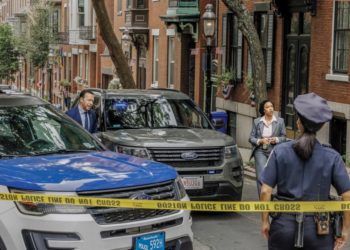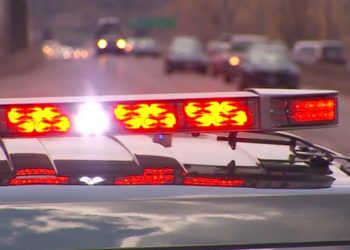The fragrant steam rose from the plates of pasta like mist from a hot spring as the famished Venezuelan newcomers lined up to eat on a frozen Chicago November afternoon in 2023. Many arrived in shorts and flip-flops.
I had partnered with local restaurateur Eldridge Williams to help feed and clothe the group, who had been bused up to my hometown along with other “sanctuary cities” run by Democrats by Gov. Greg Abbott of Texas as part of an inhumane political stunt. Chicagoans stepped up to aid these people in need.
It was a strain, as Mr. Abbott knew it would be. The newly elected mayor of Chicago, Brandon Johnson, had to reallocate already tight resources to help. Much of the responsibility of providing for the Venezuelans ended up being shouldered by Chicago’s Black community: Shelters were placed in our neighborhoods, and services were diverted away from our most vulnerable.
Having to take care of the needs of the new arrivals would quickly stir up resentment in a population that was already hurting. Just as Mr. Abbott had hoped, many Chicagoans wondered why the migrants’ plight had to be our problem to solve.
The apparent chaos of these arrivals, hyped by the right-wing media, helped re-elect Donald Trump. And it led directly to what happened this past week, when the federal government began treating my city like enemy territory. Rappelling out of helicopters like in a scene from “Black Hawk Down,” federal agents raided an apartment building in the predominantly Black community of South Shore, knocking down doors, separating children from their zip-tied parents and detaining people barely clothed.
Many people in Chicago assumed the targets of this action would be limited to immigrants, some of whom were, according to Trump administration officials, engaged in criminal activity. But the effects rained down on Black citizens who were caught up in the raid, too. Some Black Chicagoans expressed indignation and disbelief at seeing us be brutalized by Mr. Trump’s deployments, with one young brother exclaiming as he watched federal agents appear to choke a Black man on the street, “Ya’ll supposed to be choking Mexicans.”
At its heart, his comment speaks to Mr. Trump’s success in dividing us from one another and our humanity: a nagging devil on the shoulder of struggling Americans barely scraping together the rent and telling them someone else is to blame. It also reflects the divisions within the African diaspora, where it’s easy to lose sight of the fact that—like my own father—many Black people are also immigrants, experiencing their own traumas at the sight of these cruelties.
I visited the apartment complex on 75th Street and South Shore Drive after the raid. A friend of mine who is a journalist, Maira Khwaja of the Invisible Institute, had been one of the first on the ground and warned me of the wreckage that had been left behind by the mayhem, but seeing it in person was shocking. Tension loomed in the air even days later. A child’s soiled pink unicorn toy seemed to cry out for help beneath a broken headboard and an uprooted mattress. My heart breaks for the lessons of worthlessness being taught to these children.
Conversations with the victims of ICE’s South Shore raid reveal a people divided. One man expressed love for his new Venezuelan neighbors, one of whom helped him fix his car. Others burn with contempt, like a hot coal in weathered hands. These are hands that all too often can’t find work and are perfectly primed for pointing the finger. “I don’t agree with how they did it, but they needed to get them out,” said one disgruntled neighborhood resident.
And I get it: Not long ago, I welcomed a friend home from prison with the help of Gov. JB Pritzker. I was hopeful he’d be eligible for subsidized housing through the state’s re-entry programs, only to find that many of the opportunities had been siphoned off to the Venezuelan immigrants, and nothing was available. A crisis of conservative design, this desperate scramble for scarce resources is a rife breeding ground for ethnic animosity.
The reality of the Black American experience is that being at the heel of a racially unjust society means that the oppression of anyone invariably affects us.
Chicago has real problems and festering resentments. As industrial jobs shriveled up in the 1970s and redlining created hypersegregated neighborhoods, poverty was highly concentrated into Black communities on the South and West Sides, and along with it all of the symptoms of unemployment. Huge public housing projects were built, neglected, then torn down. Some criminal activity that had been concentrated in the projects became more dispersed. Meanwhile, the police weren’t always exactly there to protect and serve.
Extralegal detention and law enforcement terrorism are as native to Chicago as deep-dish pizza and ketchup-free hot dogs. This is the city of the disgraced detective Jon Burge, who, after leaving the military police, joined the Chicago Police Department and deployed what have been likened to military black sites to torture what has been estimated to be over 100 Black men in the 1970s to early ’90s, causing the city to pay out over $100 million in settlements. After Laquan McDonald was shot 16 times by Officer Jason Van Dyke in 2014, protests erupted downtown over his death. Then, after George Floyd, as in other cities full of people fed up with police brutality, many of us took to the streets. Some protesters vandalized property in that heated moment.
The question now is: How will Chicago’s residents respond? The protests started small, but as the stakes of the federal incursion ramp up, with Mr. Trump ordering Department of Homeland Security agents in and attempting to deploy the National Guard as well (which has been blocked, for now, by the courts), the crowds have gotten bigger and the mood more defiant. The tactics that the federal agents have used against the crowds have been so aggressive that another judge temporarily blocked the use of tear gas and pepper balls. All of this could eventually provoke peaceful demonstrators into revolt, which would also turn Chicago into the “war zone” Mr. Trump and his administration keep saying our city is, as a justification for his sending in his forces in the first place.
In Season 7 of Showtime’s “The Chi,” a show on which I appear as the character Jamal, there’s a moment when he’s shot in an attack meant for someone else and he has to wrestle with how to respond. In my creative exploration for the role, I contemplated the enormous weight of forgiveness and restraint. I sat in silence with Jamal’s gnawing, burning urge for revenge. I thought of the damage and the destruction it would do to his family, to his younger sister, who was left abandoned during Jamal’s previous incarceration. And ultimately, for the greater good of himself, and his loved ones, my character decided against it.
“The Chi” is fiction. In no way am I asking the people of Chicago to forgive the thuggish tactics of the Trump administration and other Republicans, but perhaps to consider, in our response, the damage that can be done to ourselves by a lack of organization, unity and intention in our action. If anything positive is to come from this moment, I hope it can be a reminder that we must stand up for the human rights of everyone if we expect to continue to have those rights ourselves.
Vic Mensa is a Grammy Award-nominated, multiplatinum-selling musician, an actor and an entrepreneur.
The Times is committed to publishing a diversity of letters to the editor. We’d like to hear what you think about this or any of our articles. Here are some tips. And here’s our email: [email protected].
Follow the New York Times Opinion section on Facebook, Instagram, TikTok, Bluesky, WhatsApp and Threads.
The post Trump Is Pitting Us Against One Another in Chicago appeared first on New York Times.




